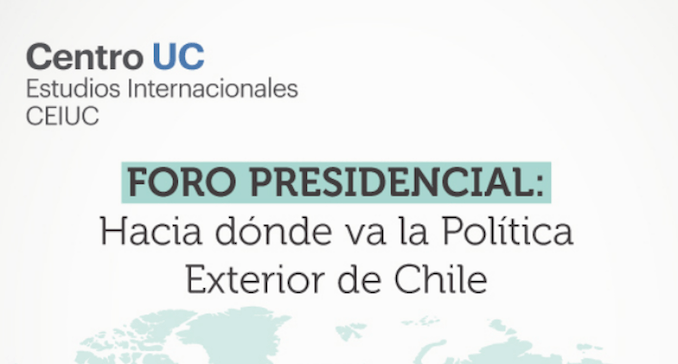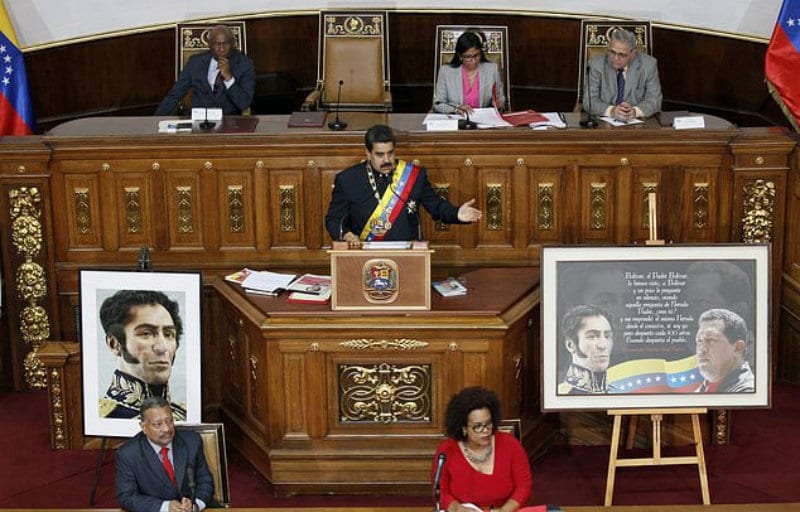
Isabel Cocker contributed to this column.
In late October Jorge Sahd, director of the Catholic University’s Center for International Studies, opened a Presidential Forum, giving representatives of all presidential candidates, except Alejandro Navarro and Eduardo Artés, the opportunity to answer the question “Where is Chilean Foreign Policy Headed?”. This way they could carve out ideological fault lines and likely trajectories the respective administrations would pursue in foreign affairs.
Foreign editor of infamous El Mercurio newspaper Juan Pablo Toro hosted the event and provoked debate right away by asking about the benefits of the Pact of Bogotá, in which Latin American nations commit to peaceful conflict resolution. Jaime Baeza for Christian Democrat Carolina Goic, argued that Chile must stand by every aspect of its international commitments, the sweet and the sour, suggesting a Goic administration would have a heightened awareness for international responsibilities, not just rights. Cristián Fuentes, representing centre-left candidate Alejandro Guillier, bluntly called ‘absurd’ any attempts at abandoning the pact.
Only Enrique Subercaseaux, for far-right fundamentalist José Antonio Kast, however, claimed the pact served only a third of Latin American countries, and not even the relevant ones. Although he did not endorse to pull out, his scepticism towards diplomacy shone often through, most unequivocally regarding Bolivia. Mr Subercaseaux insisted repeatedly that dialogue has limits if the other side doesn’t respond in kind. This view, unfortunately, signals fundamental incompetence and worryingly low valuation regarding diplomacy. Put into practice, other parties would have to calculate from the get-go that Chile walks away when talks turn tense, which would discourage upfront investing in a relationship. Kast diplomacy would also invite countries to wreck talks and then blame a feeble Chile; isolation would loom and deprive the foreign service of its ability to shape events. Diplomacy does not necessarily have an end, but is always a means. Of all candidates, Mr Subercaseaux’s and by extension Mr Kast’s flat out dismissal of diplomacy hints at the most incompetent attitude— just as Latin America is rising.
Mr Fuentes put forward a refreshing approach by stating that foreign policy can’t keep operating as shadowy state policy, where decisions are made citizens know nothing about and can’t influence. He thus proposed to subject foreign policy to public debate, but unfortunately didn’t put forward an idea on how to enthuse a consumerist public — hardly interested in voting — for yet more complexity beyond pensions and healthcare.
Moving on to Latin America’s powder keg, Venezuela, Sebastián Depolo, representing progressive candidate Beatriz Sánchez, defended strict non-intervention, but dialogue should be deepened. Promoting dialogue is noble, but in this case a non-sequitur. To talk one must know, and inevitably learns about, the other, meaning to hear both the anti-Chavist as well as the anti-Maduro Chavist opposition. This approach contradicts Mr Depolo’s argument and proves also difficult because the Maduro government has problems with foreign actors talking to non-government actors. Moreover, non-intervention naively assumes foreign and domestic policy as black and white. But in Venezuela, civil war is possible and starvation a palpable tragedy. The current situation has triggered refugee flows into Argentina, Colombia, and Chile, meaning that Venezuelan problems affect many countries at their core. Confronting Venezuela’s crisis therefore constitutes a service for human rights and turns into a national security issue.
Conservative Sebastián Piñera’s representative, Rodrigo Yáñez, indicated Venezuela’s crisis stems from the collapse Chavist institutions. Mr Yáñez thus implied these institutions need to be abolished, seemingly unaware that this would spark another revolution. Ricardo Godoy, representing forever-candidate Marco Enriquez-Ominami, The boldest intervention on the matter came from. He rightly criticised Chile’s hypocrisy in lecturing Caracas while accommodating Beijing. Sure, Beijing doesn’t cause refugee flows into Chile, but it is curious that elites of a country in which people disappeared for opposing power, are now crazy over a country in which people disappear for opposing power. Hopefully, this argument gains traction and debate ensues on how much of the country’s soul to sell, and to whom. Geopolitically, such debate would help define a bolder posture towards a superpower that builds its relations on the idea of being a natural ruler.
Afterwards, debating the inevitable Trump, no one denied the value of US relations, but differed emerged regarding the degree candidates want to deepen them. The Goic candidacy wanted to work along existing differences and Mr Piñera’s representative, unsurprisingly, pointed to education policy as common interest, which seems fitting since the Trump administration, too, uses education to funnel public money into private pockets, specifically the allies of a Christian and market-fundamentalist Michigan-based aristocracy. Kast representative Mr Subercaseaux argued that US voters made a decision Chile would have to respect, thereby letting slip a Kast administration would likely kowtow to ideological peers even at the expense of long-term national interests.
Unfortunately, no participant could articulate a holistic frame and explain how his boss would see the world. This stems from the sorry state of theory in Chile and the supremacy of the legal and economics professions, who’ve expertise in designing contracts, not grand schemes. But leading a globalising Chile demands a birds-eye view. Advisers to the next president have still homework to do.



